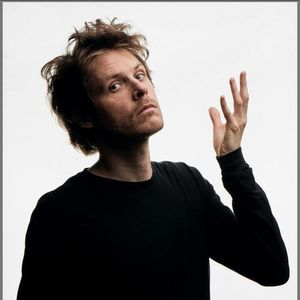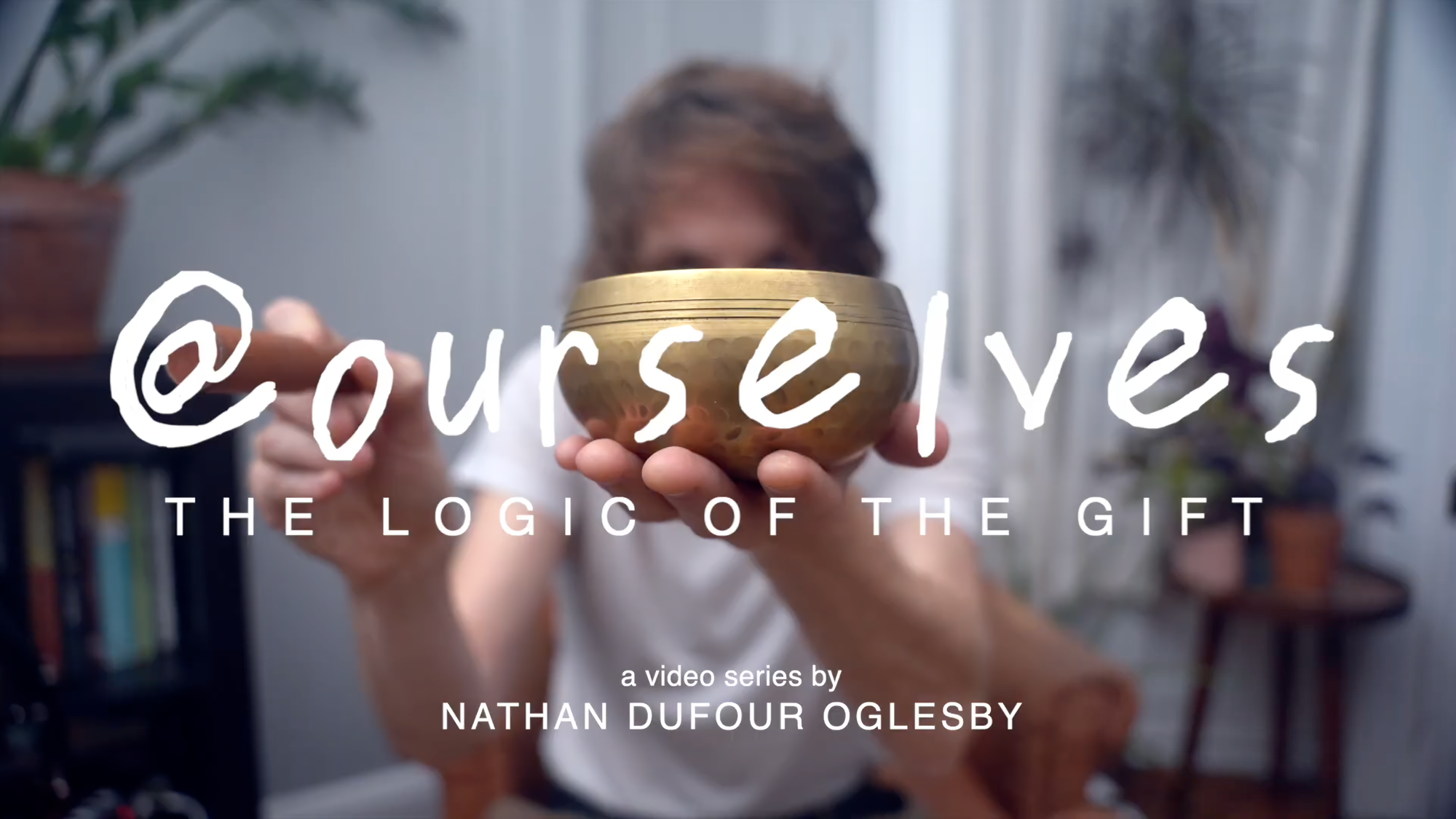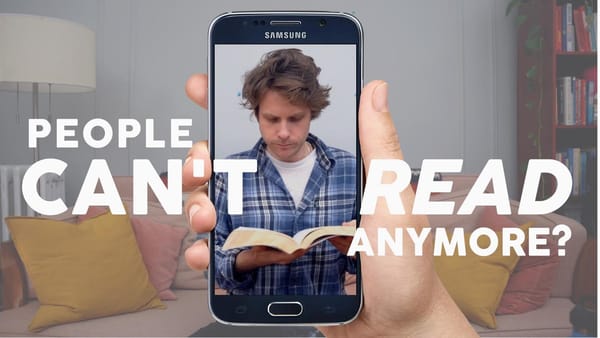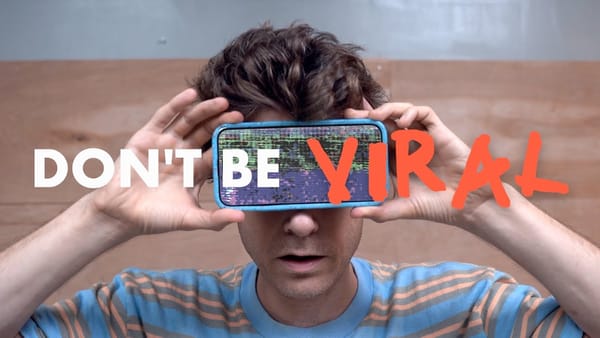Watch the essay
Watch the video essay (22 min)
Read the essay
Why did I make this video, this essay, this piece of "content" — why am I adding this utterance to the total amount of information there already is — here in this moment, as I give you this unasked for gift?
And why are you giving me the gift of your attention, when there are so many other things you could give it to?
Maybe we don't need a reason —
We could just say we're just doing it for its own sake. This life, this existence, is an end in itself— we just are, we're just here — and the stuff we make, our artistic expressions, our podcasts and videos, our pictures and posts — our information — is a natural out-flowering of our distinctly human capacity to REPRESENT reality — to make things about things, and things about things things, and things about ourselves… to render reality as information with words, images, symbols, our innumerable meanings in our matrices of media.
But how much is too much? Is there such a thing as too much information?
It’s estimated that our species has created around 149 zettabytes of information — which is 149 trillion terabytes (Statista, 2024) — each of us creating more each day than ever before; we have on a given hard drive or smartphone the informational equivalent of the entire contents of the Library of Alexandria several times over.
Perhaps there has always been too much — but perhaps right now there is especially too much too much right now; whatever that could possibly mean.
And so lately I’ve been asking myself, Why am I doing this? — why am I adding yet another recorded utterance to be stored on a server, remotely accessed and digitally reproduced?
Am I making it for you — is it a gift that’s intended for your wellbeing? Is anything ever really for you when it shows up on your For You Page?
Am I offering these things because I truly think they will “make the world a better place”? Or is that just a naive, self-aggrandizing identity structure I’ve created for myself, like Bo Burnham’s notion of “healing the world with comedy”, or Nathan Fielder’s characters who self-document their altruism while actually making everything worse?
If I’m not a Nathan For You, am I a Nathan for Me? Whom does Nathan Do Four?
I’ve been asking myself these things — perhaps "too much."
This questioning began a few years ago when I was attempting to release a solo album, and I kept finding myself unable to finish it, unable to fully will it into existence. I had all the songs nearly done — but when I faced the prospect of promoting it, of putting it out there — I kept having this sense that something feels wrong about this constant process of self-promotion, this relentless self-representation and reproduction of the informational self. In fact something feels wrong in general, on the internet, and in the world — and I think I'm not alone in this feeling.
This has led me to a kind of inertia where I feel distended by all the things I wish to express, but sometimes unable to complete them — because the matrix of discourse into which I would release them feels so overwrought, and the platforms themselves so coercive. And granted I have obsessive and depressive tendencies — but I know I'm not alone in this either, and that these conditions of discourse may make those tendencies even worse.
Something about our current culture of informational exchange makes it more and more difficult for ones offering to be given and received as a gift.
Data literally means “that which is given”. Our sense data is the givenness of the world as we find it. In a sense, every moment is a datum, the thing given to you, the originary and ever-present gift of the mystery of being here. This is it, here, the datum of existence.
What will do with your gift, in this age of so much? and to what, or to whom, will you give the gift of your being, amidst all the data you’re inundated by?
Data literally means “that which is given”. Every moment is a datum, the ever-present gift of the mystery of being here.
What will do with your gift, in this age of so much?
In recent years we have moved from what some call an "information economy" to an "attention economy" — the thing that is scarce, the thing that is truly precious, is no longer the informational offering itself — the song, the essay, the magnum opus — but the ever more limited attention of your information-inundated fellow being. The former Google analyst James Williams has written about the ethical consequences of this shift, urging the need to "liberate human attention" from the "intelligent persuasion" of our devices (Stand Out of Our Light, 2018).
It makes me wonder, if what I truly want is what’s best for my fellow beings, the best thing to give them might not be content, but formless emptiness, and silence.
Speaking of silence. How can one speak of the need for silence in a way that doesn't just add to the noise? And if my goals are really to cultivate such a silence for my own spiritual wellbeing, how can I transcend that noisy self in the context of this self-creating machine?
For the thing that confronts us here is not just the excess of other people's stuff that distracts us from ourselves — we are distracted by ourselves — the selves we have created, or have had created for us, in the curated worlds of our algorithmic lanes. It becomes more and more difficult to simply be ourselves, for we are @ourselves — we stand beside ourselves, holding ourselves by the handle, not as gifts, but as tools.
It becomes more and more difficult to simply be ourselves, for we are @ourselves — we stand beside ourselves, holding ourselves by the handle, not as gifts, but as tools.
My experience of the gift of life has often been characterized not by the enjoyment of it, or the adoration of its Source, the Giver, but the re-production of that gift in recorded form, as a commodity to be placed in an ever more exploitative context of informational exchange.
To post or not to post becomes coterminous with to be or not to be — 'all the world's a stage' becomes 'all the world's a screen' — the world is not just the world, it is @theworld — a post-world — and that secondary layer of Information becomes more primary and immediate than the original one, the layer of life itself. And sometimes, when I'm feeling my worst, this makes me want to violently peel all the layers away —to not just not be on the internet, but even, at times, to not be at all.
Now you might say, Hey Nathan, hey @nathanology_ — this sounds like a You problem — a For You problem — maybe you need to "go touch some grass."
But if you've touched any grass recently — if you've attempted to leave the internet behind, you may notice that it follows you — even when you touch grass, you are often seeing yourself touching the grass through the invisible lens of the possibility of documenting yourself doing it; you touch grass not as it is, but as one who is doing the thing that is a Thing, the thing that they call Touching Grass — the selfie takes you even when you're not taking it; the camera is on even when it is off; you cannot escape the meta-self of virtual representation. The performance replaces the experience; whether in the forest, on the front lines of the protest, or even in the ostensible silence of one's supposed meditation.
This is a phenomenon that I call Metafication, from the Greek meta, meaning “with, after, or beyond.” The company Meta is very well named — because it trades in layers of reality that are beyond beyond what is primary, and oftentimes beside the point of life itself.
The performance replaces the experience — a phenomenon that I call Metafication.
On Meta, I recreate my meat self and I meet my Metaself — and eventually I met a self I didn't like.
This is closely akin to Jean Baudrillard’s concept of hyperreality. It's also closely related to Guy Debord's concept of the spectacle — the phenomenon of modernity wherein all attention gets absorbed into representation, away from the relational immediacy of life as it actually is.
And yet here I am, representing away, in this video.
Complaining about a given medium while expressing yourself in that very medium is as old as media itself. 2500 years ago, Plato wrote about the inherently problematic nature of writing, expressing the concern that it would cause people to lose their memory, and thus lose their embodied relationship with Wisdom (in the dialogue Phaedrus). Perhaps this mistrust extends even to language itself, which, by representing reality in words, betrays and casts a shadow over it — as it is said in the Tao Te Ching, “the tao that can be spoken is not the true tao”.
Similarly, much controversy surrounded the advent of the printing press in Europe in the 15th Century. Every medium is fraught with spiritual and social complexities that are inseparable from the possibilities it opens up — "the medium is the message", as in the infamous saying of the media theorist Marshall McLuhan.
And yet, I can't help but feel that I feel more stress about Instagram and TikTok than Plato did about his stylus.
This anxiety is not limited to artists, so-called "content creators" or would-be influencers — nearly everyone is increasingly compelled to represent themselves in digital form. And this virtual identity, that which renders and represents your existence in digital space, becomes in some ways more important than the immediate physical conditions of your material being. I often look up from my laptop at a cafe at a sea of other laptops, and think about how each of us is valuing our task at hand, and its relationship, or lack thereof, to the concrete value of our actual, finite lives.
Many of us are no doubt in meetings about important causes — political causes, ecological causes — perhaps we are on Zooms that are meant to play some small part in saving the world. But the content of those meetings is often no more than the planning of future meetings — meetings about meetings about meetings and Zooms about Zooms about Zooms — the world we would save starts to recede behind the content generated about the notion that we have to save it. The same can be said for the countless works written about this very phenomena, this video included.
In a sense this is all just business as usual, the business of being a human being, the sound and fury of our linguistic, representational consciousnesses bouncing off one another in the void. But the data we generate in all of this activity is not just Being There for its own sake — it is used for a purpose, reabsorbed, repackaged and sold by the very media platforms that support our discourse.
We have entered what Shoshana Zuboff calls the Age of Surveillance Capitalism. The final frontier of the extractive impulse of capitalism is the human mind itself. Having mined the earth for its minerals, we now mine the mind by monitoring its every move through the functionally omniscient forces of automated data analysis. There's a common saying about data companies that if their service is free, you are the product. But, as Zuboff emphasizes, it's not even so much that you are the product, you are the source. You become not a gift, but a commodity.
My own name means gift — Nathan is from the Hebrew verb form “he has given” — "given" is my given name. I’ve devoted most of my gift so far — I’ve given most of myself — to creating objects of informational value, to creating artworks and sharing knowledge, as an artist and educator.
But I feel this mounting sense of crisis. Not a crisis as to whether I have things that are intrinsically valuable to express, but whether the context in which I could express them is still one in which they can be received as valuable, in the current conditions of informational exchange.
In the midst of this, what is a content creator to do? What is anyone to do, when our ever accelerating technologies of discourse radically challenge our conception of our value as individuals and that of our creative expressions — the value of our gifts, and the gift of our lives?
I'd like to invite you into a series that explores these topics — some content about the dis-content that the world has become — to which this video that you're now watching provides an introduction.
It’s called @ourselves: Art, Ego and Identity in the Age of Information.
It’s a cycle of Songs, Essays and other content, dedicated to exploring What it Means to Be a Self, to Promote Oneself, and to generate a Self-Reflective Identity in our modern contexts of information-dissemination on the internet and beyond.
But it's also called Nathanology: The Logic of the Gift.
Because it's also a very personal story of my own experience with these things as an artist and educator, and the struggles of mental health that have come with my attempt to "make it" as a "content creator" — and my attempt to find my way back through the layers of self that I have presented to the world, to reclaim the gift of simply being.
That's right, it's a series with two names. It's @itself.
You can only be @yourself if you're in some way estranged from yourself. And so this is not just a critique of metafication, it's also an outline for reintegration — an exploration of how our currently dis-integrated cultural disciplines of art, education and spirituality can be brought back together into a unified whole. — It's a journey from the personal Ego to the universal Eco and back again, in synthesis.
In the course of this series we'll explore the changing nature of art, education and media amidst the emergence of AI, the process by which our virtual environments construct our identity and encourage us to become virtual brands, the tension between self-promotion and self-transcendence as we approach the possibility of technological singularity, and the need to consciously reintegrate ourselves with the finitude of our material selves, with matter itself, and with the source of the material world — with God.
...For what have I found on this sojourn through the commodified self, seeking to return to the primacy of the gift?
I have found that I am not only here to make stuff to give to the world, but to simply be the gift that I am. And I have done this — I have rediscovered myself as gift — by seeking the Giver. Or rather, the Giver has sought me.
On this sojourn through the commodified self, I have found that I am not only here to make stuff to give to the world, but to simply be the gift that I am.
That's right, it's getting religious.
In her book Self-Made, Tara Isabella Burton charts the genesis of our culture's obsession with self-representation, tracing it to the early modern idea that "we create ourselves", which has gradually overtaken the older notion that we were created by and for God.
What — or Who — do I mean by God? That's one of the things this series will ultimately explore. For now it suffices to say this: that being in relationship with the Source of Reality is very much a matter of Attention — and attention is the very thing that the culture of too much has made scarce.
Relationship with God is a matter of attention.
In the words of St. Thérèse of Lisieux, God is found in a "a surge of the heart, a simple look toward heaven" — but that simple look may take more strength than it has ever taken, to resist the black hole of the informational matrix, the endless scroll, the abyss of self.
The platforms that dominate our daily experience have convinced us that we are not just beings but brands — that we are defined by how we represent ourselves, and by the marketability of what we make and produce — while our attention, and our very lives, are consumed.
But I am not ultimately defined by being a Creator — rather I am defined by being a Creature. My identity, my value do not come from the gift that I offer but the gift that I am — and this is a great mystery, this strange datum, this present fact I am given to be.
I do truly feel that what I'm doing right now is my "purpose" — to create, and to express — and maybe you feel this sense of purpose too. — But if we get too caught up in this instrumental self-concept, this identity structure by which we're encouraged to make brands of our very lives — we turn ourselves into mere tools, rather than freely living the gifts of our being. Like this very essay, we don't need to be — we just are.
This mirrors — or extends — the glorious needlessness of existence itself. It does not need to be — it simply is, as a gratuitous overflow of the divine creativity. God gives God's self to the world for its own sake, for the Love of it.— God is not an advertiser; God is a craftsman.
And so this, at last, brings me to an answer as to why I'm making this. It's not a binary choice between whether I'm making this For Myself or For You. There is a third choice that is neither of these, but encompasses both. I'm doing it For God. — Or better said, if I'm doing it well, God is doing it through me. There is no content that will bring any contentment that does not affirm this basic intention, this primary presence.
Our technologies of discourse are not evil; but they are capable of evil insofar as they're designed to distract us from precisely this. By being called into a program of constant self-representation, we are called out of this intrinsic eternity into the extrinsic meta-layering of mask on mask, of self on self. To sin is literally to miss the mark — we find ourselves missing the mark of the moment.
God is a matter of attention, and attention is a matter of matter — an attunement to the primary layer of our experience, our physical selves. It does indeed help to "touch grass" — but you can't just touch it and be automatically healed; it's a constant practice to remove the invisible screen that lingers between your fingers and your fellow being.
For me, this required what has essentially been a giving up — a willingness to not make it; even a willingness to NOT make anything at all — a fore-giveness of myself, the recognition of being already a gift as I am given, as a precondition for being able to freely give something new.
This doesn't mean don't make stuff. We cannot succumb to a digital pessimism that renders our very calling as humans — our ability to add layers to creation — null and void. Rather, it simply means, create integrally, and make beautiful stuff for God. Sacred Art that recognizes Reality as it is — Digital personalism where things are made and shared with actual Care. Not just to be viral, replicating the self in virtual space, but to be vital, affirming the material relations that constitute life.
Not just to be viral, replicating the self in virtual space, but to be vital, affirming the material relations that constitute life.
It has taken me so much effort of attention to express this. I've gone around in circles, and written countless drafts over several years. I've literally nearly lost my mind trying to complete this project, caught in the web of trying to express the excess of expression itself. And in the course of even editing and publishing this today I've gotten distracted and looked and my phone approximately one billion times.
I release it here now not because it's necessary; but to reach out to you, for its own sake, for love — as a gratuitous affirmation of the love that God is. God's love is not mere self-reflection, a meta-layer added to what was already there — but a self-revelation of what actually exists — this datum, this Gift, which is actually Here.
Thank you for receiving the gift of this thought.
The word Thanks is related to the word Think. Thinking itself is an act of Giving Thanks — in thinking beings such as ourselves, it is the capacity of matter to recognize its source.
It is possible to overthink — I obviously know this well.
But we don't make the Too Much go away by simply adding nothing. The thing to hope for is not the annihilation of the internet, nor the wish I sometimes feel for the annihilation of my very self — for the eternal silence of nonbeing. The Source Reality is an articulate silence — a living, feeling, Thinking, a Word in which all creation shares.
As it's said in the Dhammapada: Better than a thousand useless words is one useful word, hearing which, one attains peace.
And this goes for any content, any album, any word.
Better than a million views is one look toward heaven.
This look is not a look upwards, but a look at what's here.
Only in meditation does one regain the silence that gives meaning to all that is said. Only in matter does one rediscover the spirit that gives it form. Only in being for God can we be ourselves.
Attention and focus on what just is, is a share of paradise. To be in the moment and not just at it — to be not @ourselves, but together and in God, exchanging our thoughts in the Logic of the Gift.








Member discussion